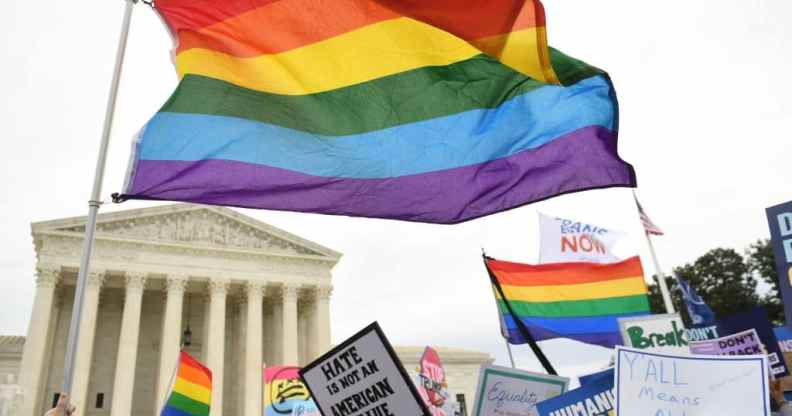Christian bigot sues for right to discriminate against staff for being gay, trans or having anal sex

Demonstrators wave LGBT+ Pride flags outside the US Supreme Court in Washington, DC, 8 October, 2019. (AFP via Getty/ SAUL LOEB)
A Christian management company is suing for the right to discriminate against workers for being members of the LGBT+ community, having sex and using Grindr.
In June 2020, the US Supreme Court ruled that the prohibition on sex discrimination in Title VII of the Civil Rights Act 1964 also applied to discrimination based on sexual orientation and gender identity.
That history-making decision upheld a position maintained by the Equal Employment Opportunity Commission (EEOC) since 2015.
Almost a year on since that decision paved the way for greater protections for LGBT+ people in the workplace, Steve Hotze is seeking an exemption to the Supreme Court’s ruling that would allow him to fire LGBT+ staff due to his religious beliefs.
Hotze – a conservative Christian with a long history of opposing LGBT+ rights – has filed a lawsuit in Texas alongside the Bear Creek Bible Church asking for a religious exemption to employment equality laws.
The lawsuit decries the fact that the EEOC’s guidance around discrimination offers no “exemptions or accommodations for employers that oppose homosexual or transgender behaviour on religious grounds.”
Furthermore, the lawsuit claims the EEOC rules do nothing to “shield churches or religious schools that require their non-ministerial employees (such as secretaries and janitors) to refrain from homosexual or transgender behaviour.”
The lawsuit continues: “Dr Steven F Hotze is a Christian, and he operates his business according to his Christian beliefs found in the Bible. Because Dr Hotze operates his corporations as Christian businesses, he does not allow Braidwood (his management firm) to hire or employ individuals who are known to engage in sexually immoral behaviour or gender non-conforming conduct of any sort, including homosexuality, cross-dressing or transgenderism.”
Steve Hotze is ‘caught in a bind’ because he can’t legally discriminate against LGBT+ people
Hotze’s lawsuit goes on to request that he be allowed to discriminate against LGBT+ workers under the federal Religious Freedom Restoration Act or the free exercise clause of the First Amendment.
Steve Hotze and Bear Creek Bible Church are “caught in a bind,” the lawsuit claims, because they “have no way to avoid violating their religious beliefs” under the law.
In a particularly bizarre section of their lawsuit, Hotze and Bear Creek Bible Church argue that they can put in place rules that comply with the Supreme Court’s June 2020 ruling that would also allow them to discriminate against LGBT+ workers.
In effect, they argue that they should be allowed to discriminate against queer people – as long as they apply their rules equally to men and women.
The plaintiffs offer a series of examples of how they can exclude LGBT+ people from their workplaces while still meeting the obligations of the Supreme Court’s ruling.
The examples include: “No employee, male or female, may enter a gay bar or gay bathhouse,” and: “No employee, male or female, may engage in the sexual practices associated with homosexuality.”
Another example of a rule reads: “No employee, male or female, may use Grindr (or other dating apps used primarily by homosexuals.” They also list other suggestions that would ban trans staff from accessing hormone therapy or gender affirmation surgeries.
Elsewhere in the lawsuit, the plaintiffs suggest that the June 2020 Supreme Court ruling should only apply to gay and trans workers, while employers should be free to discriminate against bisexual people.
The lawsuit asks that a judge grant a permanent injunction against the EEOC, and they have also requested permission for class-action status.
The lawsuit has been filed in the Fort Worth division in Texas, where US District Judge Reed O’Connor presides. O’Connor is a well known as a right-wing judge – he has previously struck down Obama-era protections for transgender people.
Attorneys from the EEOC and the Department of Justice have not yet filed their responses to the lawsuit.

